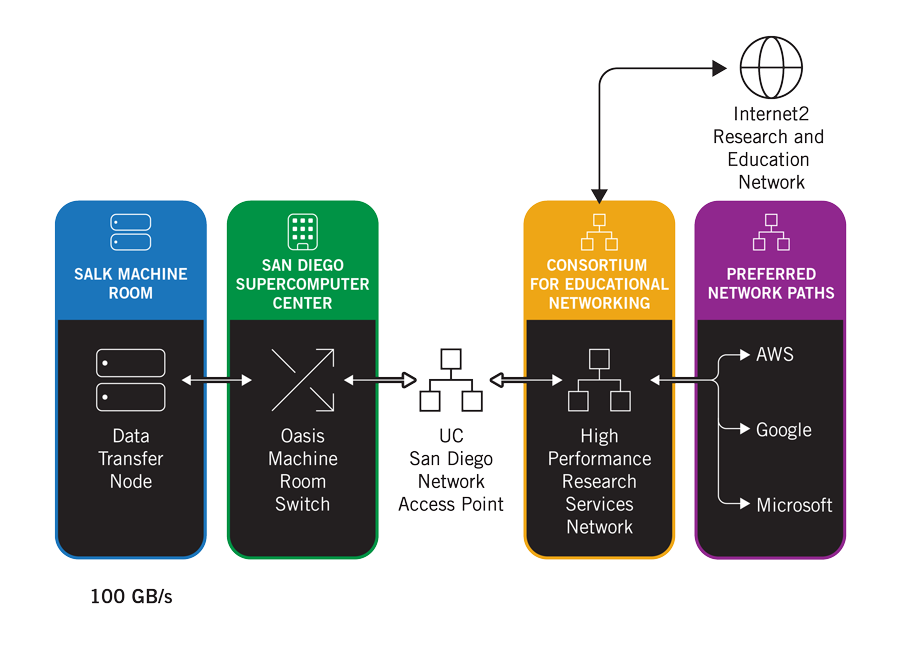Resources
Manticore: Salk’s A40 Graphics Processing Unit (GPU) Cluster
Manticore represents a significant leap in computational capabilities at the Salk Institute, providing invaluable access to high-performance computing capabilities essential for computationally intensive scientific research. Manticore, featuring 34 NVIDIA A40 GPUs, delivers exceptional computational power for data-intensive research tasks. With its scalable design, the cluster handles extensive workloads and supports various applications, including deep learning and neural network training. Seamlessly integrated with Salk’s existing infrastructure, Manticore enhances research capabilities by accelerating data processing, fostering collaboration, and enabling innovative scientific exploration.
Manticore is built with 16 Dell R750xa nodes optimized for high-performance computing with 64 NVIDIA A40s. Each node is equipped with 512GB of memory, facilitating the handling of large datasets and complex computations. Storage for each node is provided through one 480GB RAID for the operating system and an additional 6.4TB Non-Volatile Memory Express drive. Nodes are networked with dual port 10GBE Small Form Factory Pluggable (SFP) network interface cards. The cluster operates on Ubuntu and uses Run:AI as a middleware to help optimize cluster workloads.
With this strategic infrastructure investment, the Salk Institute establishes a foundational infrastructure that significantly enhances Biocomputation computing infrastructure, enabling researchers to leverage cutting-edge data analysis, modeling, and simulation technologies.
Salk Biocomputation Cloud and Software Development Team
As part of the Biocomputation Initiative, Salk is enhancing its robust on-premises computational and data storage resources by actively building infrastructure that integrates commercial and academic cloud resources. This initiative aims to support the Institute’s groundbreaking biological science.
Our newly formed Biocomputation Cloud and Software Development team is at the heart of this strategy. This dedicated team, part of our Research IT department, collaborates closely with faculty and the Salk Research Community. Their primary focus is developing software solutions that enable biological research codes to run seamlessly on remote computing resources. This is achieved using dedicated high-speed data networks and advanced “big data” storage solutions.
The Biocomputation Cloud and Software Development team offers a range of services, including:
- Consultation: Providing on-demand advice and expertise to researchers.
- Collaboration: Assisting in developing technical architectures and supporting research grant implementations.
- Training and Documentation: Offering comprehensive training sessions and detailed documentation to ensure effective use of computational resources.
This team is integral to advancing our research capabilities, ensuring that Salk remains at the forefront of biological science innovation.
Salk Science Network (SciNet)
SciNet is network exclusively devoted to the high-speed transfer of scientific data with 100Gb/s connectivity to the national research and education community and preferred pathways to commercial cloud partners including Amazon, Google, and Microsoft.
SciNet is a specialized architecture that functions like a high-speed data expressway, separated from the everyday traffic of regular internet use, such as emails, web browsing, and video conferencing. By isolating scientific data traffic, the network ensures that large data transfers, such as single-cell genomic pipeline data or cryogenic electron microscopy (cryo-EM) high-resolution imaging data, occur quickly and reliably without the typical slowdowns caused by network congestion.
Additionally, this architecture incorporates advanced security measures, protecting sensitive research data while allowing seamless access to remote computing resources and collaborative platforms. As a result, SciNet significantly enhances the efficiency and speed of data-intensive scientific research, empowering researchers to focus more on analysis and discovery rather than on the logistics of data transfer.

Learn more about:
- More about Science DMZs
- More about the San Diego Supercomputing Center
- More about CENIC
- More about Internet2
- More about Internet2 Members
